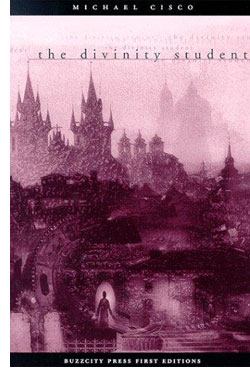 |
 |

Michael Cisco
Illustrations Harry O. Morris
The Divinity Student
Buzzcity Press
US Trade Paperback Original
ISBN 978- 0-9652200-1-X
Publication Date: 05-01-1999
149 Pages; $12.99
Date Reviewed: 06-10-2002
Reviewed by: Rick Kleffel © 2002
Index:
Fantasy
General Fiction
Horror
Language assumes a different level of import in differing novels. Much of today's fiction attempts and achieves "transparency", that is, prose that does not get in the way of the story and does not require a great effort to read. Some writers hold language to a higher standard. Michael Cisco, author of 'The Divinity Student' is clearly such a writer. You, the reader, are going to have to put some effort into reading this novel. You're going to have to think about the specific words on the page, how they connect to one another, the story — such as it is — to your world and the world the writer is trying to create. From the very beginning, it's clear that 'The Divinity Student' is about language. But it takes about half this slim novel for the Cisco to clue in the reader why language is important to the plot. In the interim, gorge on the gorgeous. Fill yourself up with words. If this is the kind of effort you are willing to make as a reader, then it is well worth the effort.
From the first, let me emphasize that this trade paperback is beautifully produced and printed. The illustrations by Harry O. Morris, one of my favorite illustrators since the (to me) trend-setting Scream/Press edition of 'Books of Blood', are the perfect pitch, surreal, slightly disturbing. 'The Divinity Student' at first struck me as a collection of stories. Each chapter is titled, and many are illustrated. Only recently did I actually suss it was a novel and move it up the food chain and queue for reading. I'm glad I did, and annoyed that I didn't pick up on this when I first bought it, some two years ago. Such are the problems of an overly large reading queue. As the novel begins, the Divinity Student is wandering in afield when he is struck by lightning. In a surreal scene that no summary will do justice, his body is eviscerated, and he is stuffed with pages and resurrected. Soon, he is sent to San Veneficio. The reader might begin to think that the novel will simply be a series of floaty, surreal scenes without a unified purpose. On that level, it's certainly enjoyable as a work of wonderful prose. But that's clearly not the only level.
Cisco is writing the kind of novel that you could easily base a thesis or two on. It would be child's play to write 300 pages of analysis of this 149 page novel. The writer's wordplay is constant, effervescent, leaving the reader feeling slightly dazed. In that event, the book is doing precisely what the writer wants it to. In an interesting, brief afterward, he states that he thinks 'Reading is a form of hypnosis'. If you're reading this book it certainly is.
Now that requires a bit of an effort, as I've stated. This isn't 'transparent' prose that merely gets the action in the reader's brain. This is complex verbal gamesmanship, the kind of writing that often doesn't fare well in an extended setting. Thomas Ligotti excels at this sort of thing, but then he only writes short stories. Cisco actually manages to pull a novel out of his levitation act.
About halfway through in an almost electrifying scene (more so than being struck by lightning, though that's pretty strong writing as well), Cisco introduces the plot. It's like a hint of melody in a minimalist piece of music. Tonic, bracing, it rings true and carries the reader ecstatic through the more gruesome final half of the novel. The images rush, the reader sucks up the words greedily, the words build a world on the page and in the reader's minds, the world's coalesce, dissolve, become one then separate again. All the magic is in the language. And that's all the magic that Cisco needs. Some people can't take hallucinogenic drugs. The experience is too strong. If you're one of those people, you might find 'The Divinity Student' is a bit too strong for your tastes. But if you're ready to be hypnotized, if you're ready to enter a word trance, then there's probably no better place to start than a lesson from the 'The Divinity Student'.
|
 |
|
|
 |
| |
Review Archive
All Reviews alphabetized by author.
General Fiction
Non-Genre, general fiction and literature.
Horror
Supernatural fiction, supernatural horror and non-supernatural horror.
Science Fiction
Science fiction, science fantasy, speculative fiction, alternate history.
Fantasy
Fantasy, surrealism and magic realism.
Mystery
Crime, thrillers, mystery, suspense.
Non-Fiction
Non-Fiction, True Crime, Forteana, Reference.
Poetry
|
|
 |
|




